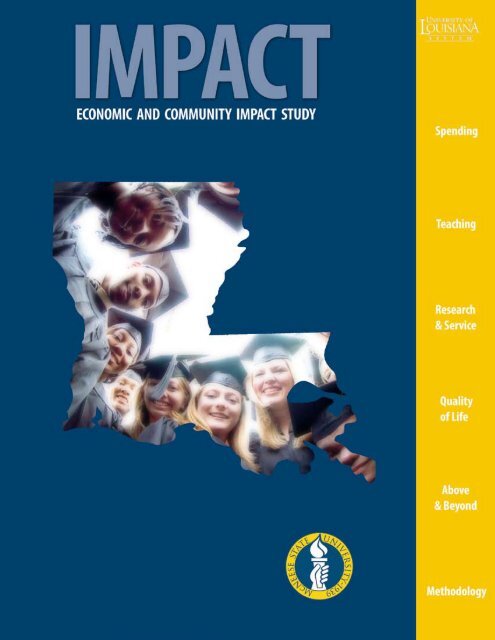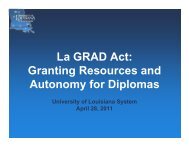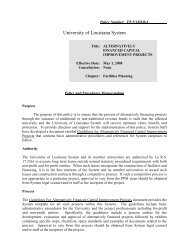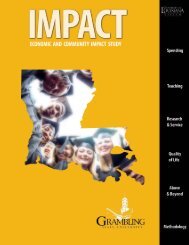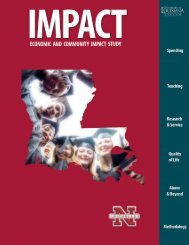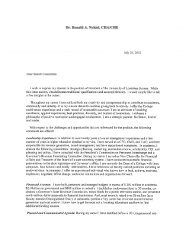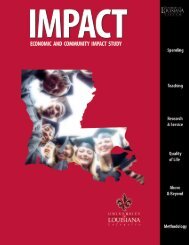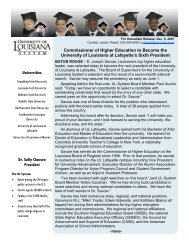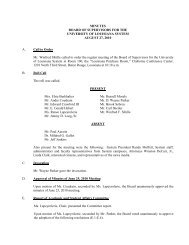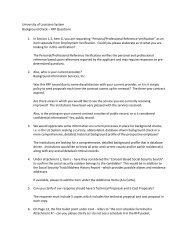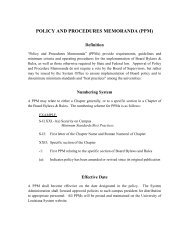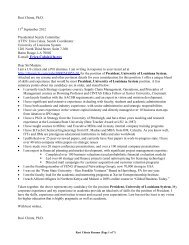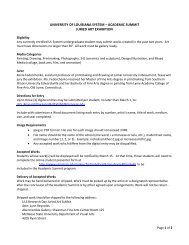McNeese State University Report (.pdf) - University of Louisiana ...
McNeese State University Report (.pdf) - University of Louisiana ...
McNeese State University Report (.pdf) - University of Louisiana ...
Create successful ePaper yourself
Turn your PDF publications into a flip-book with our unique Google optimized e-Paper software.
<strong>University</strong> <strong>of</strong> <strong>Louisiana</strong> System<br />
Board <strong>of</strong> Supervisors<br />
Mrs. Elsie P. Burkhalter, Chair<br />
Mr. E. Gerald Hebert<br />
Mr. Winfred F. Sibille, Vice Chair<br />
Mr. D. Wayne Parker, Parliamentarian<br />
Mr. Paul G. Aucoin<br />
Mr. Andre G. Coudrain<br />
Mr. Edward J. Crawford, III<br />
Dr. Mildred G. Gallot<br />
Mr. Gregory S. Hamer, Sr.<br />
Mr. Jeffrey Jenkins<br />
Ms. Renee A. Lapeyrolerie<br />
Mr. Jimmy D. Long, Sr.<br />
Mr. Russell L. Mosely<br />
Mr. Carl G. Shetler<br />
Dr. Eunice W. Smith<br />
Ms. Morgan Verrette, Student<br />
Acknowledgments<br />
Many hours were contributed towards the data<br />
collection, analysis, review and production <strong>of</strong><br />
materials associated with the Economic and<br />
Community Impact Study. Special thanks are due<br />
to the Project Management Team: Dr. Jeanne<br />
Daboval, provost and vice president <strong>of</strong> academic<br />
affairs (chair), Michael Graham, chief information<br />
technology <strong>of</strong>ficer, Kay Dougay, director <strong>of</strong><br />
institutional research, Dr. Doug McNiel, pr<strong>of</strong>essor<br />
<strong>of</strong> economics, Dr. Toby Osburn, dean <strong>of</strong> student<br />
services, and Candace Townsend, director <strong>of</strong><br />
public information and communications, who<br />
were responsible for collecting and coordinating<br />
the survey data for the study and its submission,<br />
documentation and communication efforts. The<br />
Project Management Team is grateful to everyone<br />
who responded to surveys and contributed time to<br />
research and compile the data.
A Message from<br />
<strong>McNeese</strong> <strong>State</strong> <strong>University</strong><br />
President<br />
Robert Hebert<br />
As one <strong>of</strong> the largest employers in the five-parish area,<br />
<strong>McNeese</strong> <strong>State</strong> <strong>University</strong> is a major contributor to the<br />
economy <strong>of</strong> Southwest <strong>Louisiana</strong>. Our employees and<br />
students live in cities and communities throughout Allen,<br />
Beauregard, Calcasieu, Cameron and Jefferson Davis parishes.<br />
<strong>McNeese</strong> awards nearly 70 percent <strong>of</strong> the public four-year<br />
college degrees earned by residents <strong>of</strong> Southwest <strong>Louisiana</strong>.<br />
Our dedication to teaching and academics is strong and<br />
we are proud <strong>of</strong> our commitment to student success.<br />
“Excellence with a Personal Touch” is more than just a<br />
<strong>University</strong> slogan; it is a creed and words we strive to live by.<br />
<strong>McNeese</strong> alumni have achieved impressive accomplishments<br />
and continue to be major contributors to the economy<br />
in many different ways. They are the teachers, attorneys,<br />
engineers, physicians, businessmen and women,<br />
nurses, scientists, cultural leaders and law enforcement<br />
personnel that live and work in our communities.<br />
Approximately one-third <strong>of</strong> the engineers working in<br />
the local petrochemical industry are <strong>McNeese</strong> graduates.<br />
Nearly 80 percent <strong>of</strong> all nurses working in Lake Charles<br />
and surrounding communities are <strong>McNeese</strong> graduates.<br />
School districts in the five-parish area rank among<br />
<strong>Louisiana</strong>’s top 10 districts in high school graduation<br />
rates. More than 70 percent <strong>of</strong> the educators in Allen,<br />
Beauregard, Calcasieu, Cameron and Jefferson Davis<br />
parishes earned a degree from <strong>McNeese</strong> and 99 percent <strong>of</strong><br />
the administrators in these parishes are <strong>McNeese</strong> graduates.<br />
We were severely tested in September 2005 by Hurricane<br />
Rita. Following 14 consecutive enrollment increases,<br />
<strong>McNeese</strong> had a record enrollment <strong>of</strong> 8,992. When classes<br />
resumed in late October, 700 students withdrew and the<br />
<strong>University</strong> faced more than $30 million in damages. Today,<br />
almost all <strong>of</strong> the damage has been repaired, enrollment<br />
is on the upswing, and more than $50 million in capital<br />
outlay projects are in planning or construction phases.<br />
Everyone in Southwest <strong>Louisiana</strong> is connected to, or<br />
touched by, <strong>McNeese</strong> in one way or another. This economic<br />
impact study illustrates the importance <strong>of</strong> <strong>McNeese</strong> <strong>State</strong><br />
<strong>University</strong> in dollar figures. What cannot be calculated is<br />
the human factor and the invaluable contributions almost<br />
1,000 <strong>McNeese</strong> employees, 8,000 students and tens <strong>of</strong><br />
thousands <strong>of</strong> area alumni make to our communities and<br />
to our civic, volunteer and religious organizations.<br />
For 70 years, Southwest <strong>Louisiana</strong> has relied on <strong>McNeese</strong> to<br />
provide an educated and well-prepared workforce, to provide<br />
employment opportunities, to host cultural and competitive<br />
athletic events and to purchase local goods and services.<br />
<strong>McNeese</strong> <strong>State</strong> <strong>University</strong> is a major force in improving the<br />
quality <strong>of</strong> life and the economy in Southwest <strong>Louisiana</strong>.<br />
Contents<br />
5<br />
17<br />
<strong>University</strong> <strong>of</strong> <strong>Louisiana</strong> Impact <strong>of</strong> Research &<br />
System<br />
Service<br />
29<br />
Methodology<br />
9<br />
Impact <strong>of</strong> Spending<br />
13<br />
Impact <strong>of</strong> Teaching<br />
21<br />
Impact on Quality <strong>of</strong> Life<br />
25<br />
Above & Beyond
EIGHT UNIVERSITIES STRONG: With over 80,000 students, the <strong>University</strong> <strong>of</strong> <strong>Louisiana</strong> System is the largest<br />
higher education system in the state and produces about half <strong>of</strong> all undergraduate degrees.
<strong>University</strong> <strong>of</strong> <strong>Louisiana</strong> System<br />
Institutions <strong>of</strong> higher learning have a direct impact on<br />
the economic success <strong>of</strong> a state and region, and there<br />
is a direct correlation between higher education and<br />
the positive outcomes on quality <strong>of</strong> life measures.<br />
In essence, higher education pays.<br />
College graduates earn more and spend more than those<br />
without a college degree. The taxes paid by college<br />
graduates are greater and are used for the public good,<br />
including repaying the cost <strong>of</strong> a college education<br />
several times over.<br />
The state’s investment in higher education is an<br />
investment in the future <strong>of</strong> <strong>Louisiana</strong> as college graduates<br />
are productive members <strong>of</strong> society, paying taxes,<br />
volunteering, voting and raising families with similar<br />
goals <strong>of</strong> attaining a college degree.<br />
With over 80,000 students, the <strong>University</strong> <strong>of</strong><br />
<strong>Louisiana</strong> System is the state’s largest higher<br />
education system. Consisting <strong>of</strong> eight four-year<br />
universities strategically located across the state,<br />
the economic and quality <strong>of</strong> life impacts <strong>of</strong> the UL<br />
System enrich each <strong>of</strong> the state’s 64 parishes.<br />
As evidenced in the comprehensive study <strong>of</strong> the economic<br />
and community impacts <strong>of</strong> the eight universities in the<br />
<strong>University</strong> <strong>of</strong> <strong>Louisiana</strong> System, investments in higher<br />
education have a ripple effect on the economic vitality<br />
<strong>of</strong> the entire state and the quality <strong>of</strong> life <strong>of</strong> its citizens.<br />
Our universities provide jobs, train future workforces,<br />
incubate businesses, create and bolster new<br />
industries, enrich the lives <strong>of</strong> residents through<br />
the arts and humanities, and sustain the financial<br />
stability <strong>of</strong> communities where they are located.<br />
The combined impacts <strong>of</strong> Grambling <strong>State</strong> <strong>University</strong>,<br />
<strong>Louisiana</strong> Tech <strong>University</strong>, <strong>McNeese</strong> <strong>State</strong> <strong>University</strong>,<br />
Nicholls <strong>State</strong> <strong>University</strong>, Northwestern <strong>State</strong> <strong>University</strong>,<br />
Southeastern <strong>Louisiana</strong> <strong>University</strong>, the <strong>University</strong><br />
<strong>of</strong> <strong>Louisiana</strong> at Lafayette and the <strong>University</strong> <strong>of</strong><br />
<strong>Louisiana</strong> at Monroe are in the billions <strong>of</strong> dollars.<br />
That’s the power <strong>of</strong> EIGHT<br />
UNIVERSITIES STRONG.<br />
Spending<br />
The UL System’s statewide annual<br />
economic impact is $3.4 billion and<br />
supports 34,800 non-university<br />
jobs.<br />
This includes:<br />
•<br />
•<br />
•<br />
•<br />
•<br />
•<br />
•<br />
•<br />
$101 million from affiliated<br />
organizations,<br />
$148 million in health<br />
insurance payments,<br />
$131 million impact <strong>of</strong> retiree<br />
spending,<br />
$334 million in university<br />
operations,<br />
$222 million in construction<br />
and capital outlay,<br />
$487 million from visitors,<br />
$661 million in faculty and<br />
staff expenditures, and<br />
$1.3 billion impact from<br />
student spending.<br />
Teaching<br />
UL System graduates have added<br />
$6.5 billion to <strong>Louisiana</strong>’s economy<br />
over the last 10 years. Bachelor’s<br />
degree holders have generated $5.6<br />
billion, master’s degree holders<br />
$728 million, and associate’s<br />
degree holders $143 million.<br />
UL System schools produced<br />
455,669 degrees over the last<br />
50 years with 122,974 graduates<br />
between 1998 and 2007.<br />
In the past 10 years the UL System<br />
generated the majority <strong>of</strong> graduates<br />
in the fields <strong>of</strong> criminal justice,<br />
family and consumer sciences and<br />
human sciences, health and fitness<br />
studies, public administration and<br />
social work, health pr<strong>of</strong>essions and<br />
clinical sciences, education, visual<br />
and performing arts, computer and<br />
information sciences, and business,<br />
management and marketing.<br />
Research & Service<br />
UL System campuses are bolstering<br />
opportunities for new industry growth<br />
and enhancing established industries<br />
in <strong>Louisiana</strong> through innovative<br />
research and development and<br />
by providing strategic planning and<br />
pr<strong>of</strong>essional services.<br />
This study captured 188 research<br />
and service programs in the UL<br />
System.<br />
They include:<br />
•<br />
•<br />
•<br />
•<br />
•<br />
28 in economic development,<br />
23 in engineering and<br />
technology,<br />
27 in cultural development,<br />
24 in environmental and<br />
natural sciences, and<br />
86 in education, health and<br />
human services.<br />
Quality <strong>of</strong> Life<br />
The UL System enhances life experiences<br />
<strong>of</strong> its students, employees<br />
and community members by creating<br />
unique learning and cultural<br />
opportunities.<br />
On average, there are 100 events<br />
taking place every day at UL<br />
System campuses. Last year,<br />
campus events attracted 3.7<br />
million people, 45 percent <strong>of</strong> those<br />
being <strong>of</strong>f-campus visitors.<br />
Additionally, UL System faculty and<br />
staff volunteered 567,000 hours<br />
last year, and students logged 1.9<br />
million hours in their communities.
<strong>University</strong> <strong>of</strong> <strong>Louisiana</strong> System<br />
The <strong>University</strong> <strong>of</strong> <strong>Louisiana</strong> System is comprised <strong>of</strong>: Grambling <strong>State</strong> <strong>University</strong>, <strong>Louisiana</strong> Tech <strong>University</strong>, <strong>McNeese</strong> <strong>State</strong><br />
<strong>University</strong>, Nicholls <strong>State</strong> <strong>University</strong>, Northwestern <strong>State</strong> <strong>University</strong>, Southeastern <strong>Louisiana</strong> <strong>University</strong>, <strong>University</strong> <strong>of</strong> <strong>Louisiana</strong><br />
at Lafayette, and <strong>University</strong> <strong>of</strong> <strong>Louisiana</strong> at Monroe. The value added to <strong>Louisiana</strong>’s economy by increased taxable earnings<br />
<strong>of</strong> UL System graduates over the last 10 years is $6.5 billion.<br />
“Eight Universities Strong” is more<br />
than just a tagline. It’s a reflection<br />
<strong>of</strong> the collaborative partnerships<br />
that exist between the eight<br />
institutions in the <strong>University</strong><br />
<strong>of</strong> <strong>Louisiana</strong> System.<br />
From joint degree programs to<br />
pooling resources for costsavings<br />
measures to student<br />
initiatives, the UL System proves<br />
universities enhance their individual impacts when<br />
working together.<br />
“Our universities have a history <strong>of</strong> working<br />
collaboratively through joint programs and sharing <strong>of</strong><br />
resources. We want to build upon that foundation, as<br />
we are good stewards <strong>of</strong> taxpayer dollars invested in our<br />
enterprises,” said UL System President Randy M<strong>of</strong>fett.<br />
Working Together in Teaching<br />
Three strong joint degree programs already exist<br />
between UL System universities.<br />
<strong>McNeese</strong> <strong>State</strong> <strong>University</strong> in Lake Charles,<br />
Southeastern <strong>Louisiana</strong> <strong>University</strong> in Hammond, and<br />
the <strong>University</strong> <strong>of</strong> <strong>Louisiana</strong> at Lafayette comprise<br />
the Intercollegiate Consortium for a Master <strong>of</strong><br />
Science in Nursing. Created in 1986, this consortium<br />
allows students to enroll in courses at any <strong>of</strong> the<br />
participating universities and receive credit toward<br />
a master’s degree. Accredited by the National<br />
League for Nursing Accrediting Commission,<br />
the advanced nursing specialty tracks <strong>of</strong>fered<br />
are nursing administration, nursing education,<br />
clinical nurse specialist, and nurse practitioner.<br />
Grambling <strong>State</strong> <strong>University</strong> in Grambling, <strong>Louisiana</strong><br />
Tech <strong>University</strong> in Ruston, and the <strong>University</strong> <strong>of</strong><br />
<strong>Louisiana</strong> at Monroe established the <strong>Louisiana</strong><br />
Education Consortium (LEC) in 1995 to <strong>of</strong>fer a joint<br />
doctoral program in education. With specialization<br />
in either curriculum and instruction or educational<br />
leadership, the Doctor <strong>of</strong> Education (Ed.D.) degree<br />
program has generated 85 graduates. Over two<br />
thirds <strong>of</strong> those graduates currently work in K-12 or<br />
higher education in <strong>Louisiana</strong>, Texas, and Arkansas.<br />
Southeastern and UL Lafayette also <strong>of</strong>fer a joint<br />
doctoral program through the Consortium for Ed.D.<br />
in Educational Leadership. Established in 2006, the<br />
program will award its first degrees in May 2009. In<br />
order for more efficient course delivery, each university<br />
has primary responsibility for certain program courses.<br />
Thus, those enrolled at Southeastern take seven<br />
courses <strong>of</strong>fered by UL Lafayette, and UL Lafayette<br />
students take seven courses <strong>of</strong>fered by Southeastern.
<strong>University</strong> <strong>of</strong> <strong>Louisiana</strong> System<br />
UL System President Randy M<strong>of</strong>fett has asked<br />
the eight university presidents to explore futher<br />
opportunities for establishing new joint course<br />
<strong>of</strong>ferings and degree programs.<br />
“We want to see more cooperative endeavors like<br />
these across our system. It’s good for the students<br />
in terms <strong>of</strong> expediting degree attainment; it’s good<br />
for faculty in terms <strong>of</strong> peer development; and it’s<br />
good for our state in terms <strong>of</strong> a higher educated<br />
citizenry and fiscal responsibility,” said M<strong>of</strong>fett.<br />
Working Together for Cost Savings<br />
Looking beyond academic collaborations, the Board<br />
<strong>of</strong> Supervisors for the <strong>University</strong> <strong>of</strong> <strong>Louisiana</strong><br />
System recently established a Cost Containment and<br />
Efficiencies Committee. The committee is researching<br />
how to build upon existing collaborations between<br />
campuses and pool resources to streamline costs.<br />
In the beginning stages <strong>of</strong> their work, the committee<br />
has already identified four ways to work collaboratively:<br />
•<br />
•<br />
•<br />
•<br />
Energy – The committee is looking at the<br />
feasibility <strong>of</strong> purchasing electricity in bulk<br />
quantities for the UL System.<br />
Credit Card Processing Fee – The committee is<br />
collecting information from the universities to<br />
explore ways to lower credit card processing fees.<br />
Telecommunications – The committee is working<br />
with the Office <strong>of</strong> Telecommunications (OTM) to<br />
determine if there are ways to cut costs for local,<br />
long-distance, e-mail, and internet connections.<br />
Healthcare – The committee is exploring the<br />
feasibility <strong>of</strong> setting up a healthcare insurance<br />
network for UL System faculty, staff, and<br />
students and other options.<br />
Working Together for Student Initiatives<br />
The UL System is a student-centered system, as<br />
evidenced by the Board-recognized Student Advisory<br />
Council (SAC). SAC consists <strong>of</strong> the Student<br />
Government Association Presidents from each <strong>of</strong><br />
the eight universities and meets regularly to share<br />
information and identify ways to work collaboratively.<br />
Past UL System student-led initiatives include the<br />
“RU Ready?” campaign, where university students<br />
visited middle schools across the state to talk about<br />
the importance <strong>of</strong> college preparation, and Extreme<br />
Spring Break, where college students traded their<br />
spring breaks to rebuild the Gulf Coast after<br />
Hurricanes Katrina and Rita.<br />
Currently, UL System students are the cornerstone <strong>of</strong><br />
the system’s service-learning and mentoring initiatives.<br />
Through a three-year, $1.2 million grant from the<br />
National Corporation for Community Service’s Learn<br />
and Service America Division, the UL System<br />
funded 70 service-learning projects and nine related<br />
mentoring programs. These projects have already<br />
engaged 675 faculty and staff, 8,462 college students,<br />
and 243 community partners.<br />
Conclusion<br />
As the largest higher education system in the state,<br />
the reach <strong>of</strong> the eight universities’ 9,500 employees and<br />
80,000 students is broad. Leveraging the power<br />
<strong>of</strong> eight four-year universities has yielded collaborative<br />
partnerships that touch academics, students, and<br />
campus operations.<br />
As the Economic and Community Impact Study<br />
reveals, each university has a significant impact on the<br />
state’s economic vitality and the quality <strong>of</strong> life <strong>of</strong><br />
its citizens. Collectively, that impact grows to<br />
a $3.4 billion impact each year that touches all 64<br />
parishes in <strong>Louisiana</strong>.<br />
“Eight Universities Strong” is more than a tagline. It<br />
defines and guides the work <strong>of</strong> the largest system in<br />
the state. The <strong>University</strong> <strong>of</strong> <strong>Louisiana</strong> System is<br />
EIGHT UNIVERSITIES STRONG!<br />
About the Study<br />
Initiated in August 2008, the <strong>University</strong> <strong>of</strong> <strong>Louisiana</strong><br />
System Economic and Community Impact Study<br />
was conducted by Applied Technology Research<br />
Corporation <strong>of</strong> Baton Rouge. The study relied on<br />
data provided by the eight universities, the <strong>University</strong><br />
<strong>of</strong> <strong>Louisiana</strong> System, the <strong>Louisiana</strong> <strong>State</strong> Employees<br />
Retirement System, Teachers Retirement System <strong>of</strong><br />
<strong>Louisiana</strong>, and the Office <strong>of</strong> Group Benefits. The<br />
methodology used is consistent with that <strong>of</strong> other<br />
university impact studies conducted around the<br />
nation.
Spending<br />
Ensuring that all students, regardless <strong>of</strong> major, can write effectively and appropriately is the goal <strong>of</strong> the<br />
<strong>McNeese</strong> Write to Excellence initiative which will enhance graduates’ job skills and benefit employers in all<br />
fields and pr<strong>of</strong>essions.
IMPACT Spending<br />
$8 Return for Every<br />
$1 <strong>Louisiana</strong> Invests in <strong>McNeese</strong><br />
<strong>McNeese</strong> <strong>State</strong> <strong>University</strong> is an essential economic<br />
driver to the state and the communities it serves.<br />
With sustained expenditures by the institution, its<br />
employees, and its students, the campus provides<br />
an economic benefit that is significant.<br />
As part <strong>of</strong> the UL System, the impact <strong>of</strong> each dollar<br />
invested in the university is multiplied by eight as it<br />
cycles through our state economy.<br />
<strong>McNeese</strong> has a total spending impact <strong>of</strong> $335 million.<br />
That includes a $34 million impact <strong>of</strong> university<br />
operating expenditures, $12 million from capital<br />
outlay and construction projects, $12 million from<br />
health insurance payments, $11 million from retiree<br />
spending, $47 million from visitor expenditures,<br />
$55 million from spending by faculty and staff,<br />
and $145 million from student expenditures.<br />
Job Creation<br />
An additional benefit to <strong>McNeese</strong> spending is the<br />
creation <strong>of</strong> 3,520 non-university jobs throughout<br />
<strong>Louisiana</strong>. These are full-time equivalent<br />
positions that support expenditures such as<br />
construction, healthcare, and food services.<br />
Students<br />
MSU’s enrollment plays an important role in supporting<br />
the community. Its spending in areas such as<br />
housing, food, entertainment, telecommunications, and<br />
transportation generates an annual $145 million<br />
impact on <strong>Louisiana</strong>’s economy.<br />
Student spending at MSU also supports over 1,400<br />
non-university jobs in <strong>Louisiana</strong>’s restaurant,<br />
entertainment, and retail industries.<br />
Spending<br />
$335 Million<br />
Annual Impact<br />
IMPACT<br />
by Source
Spending<br />
Spending<br />
3,520 non-university<br />
jobs created as a result <strong>of</strong><br />
<strong>McNeese</strong> spending<br />
Faculty/Staff<br />
There are over 900 faculty and staff employed by<br />
<strong>McNeese</strong> <strong>State</strong> <strong>University</strong>. Their expenditures<br />
on items such as housing, food, entertainment,<br />
telecommunications, and transportation generate an<br />
annual $55 million impact on <strong>Louisiana</strong>. Those<br />
expenditures also support over 500 jobs.<br />
<strong>University</strong> Operations<br />
In 2007-08, <strong>McNeese</strong>’s operating expenditures on<br />
items such as supplies, equipment, and services<br />
garnered an impact <strong>of</strong> $34 million on the state, 500<br />
community jobs were created as a result <strong>of</strong> university<br />
operations expenditures.<br />
Construction<br />
Between 2001 and 2008, nine construction projects<br />
occurred on <strong>McNeese</strong>’s campus. Those projects<br />
yielded a $95 million impact on the state and<br />
created more than 900 jobs.<br />
An eight-year average <strong>of</strong> construction at <strong>McNeese</strong><br />
<strong>State</strong> <strong>University</strong> revealed an average annual impact <strong>of</strong><br />
$12 million, with approximately 100 non-university<br />
jobs tied to university construction projects each year.<br />
Visitors<br />
Each year, <strong>McNeese</strong> <strong>State</strong> <strong>University</strong> hosts numerous<br />
visitors for cultural, sporting, and educational events.<br />
Visitor expenditures on items such as transportation,<br />
food, and lodging impact the state economy by<br />
$47 million.<br />
Visitor spending also accounts for more than 450 jobs.<br />
Health Insurance<br />
About 77.1 percent <strong>of</strong> <strong>McNeese</strong>’s health insurance<br />
payments are made to healthcare providers in<br />
<strong>Louisiana</strong>. Those payments generate an economic<br />
impact <strong>of</strong> $12 million and create more than 120 jobs.<br />
Retirees<br />
Approximately 87 percent <strong>of</strong> <strong>McNeese</strong> <strong>State</strong><br />
<strong>University</strong>’s retired faculty and staff reside in<br />
<strong>Louisiana</strong>, adding $11 million to the economy<br />
after their employment at the university.<br />
Their spending supports over 100 jobs.<br />
10
Spending<br />
George Swift<br />
President and CEO<br />
SWLA Economic Development Alliance<br />
Spending<br />
Affiliated Organizations<br />
Affiliated organizations are third-party<br />
entities that perform services on behalf<br />
<strong>of</strong> the university. This includes food<br />
services, bookstores, housing management,<br />
and foundations. Spending by these<br />
organizations generates an annual impact<br />
<strong>of</strong> $18 million.<br />
Conclusion<br />
Strong, significant, and symbiotic<br />
relationships exist between local<br />
businesses and the university<br />
communities they serve. The presence<br />
<strong>of</strong> UL System universities are<br />
economic engines in their regions.<br />
These study results demonstrate the<br />
extent to which <strong>Louisiana</strong>’s economy and<br />
southwestern <strong>Louisiana</strong>, in particular,<br />
are tied to <strong>McNeese</strong> <strong>State</strong> <strong>University</strong>.<br />
The Southwest <strong>Louisiana</strong> Economic Development Alliance is<br />
dedicated to bringing economic growth and diversified business<br />
opportunities to Allen, Beauregard, Calcasieu, Cameron and<br />
Jefferson Davis parishes. The Alliance is the only organization that<br />
is working to develop the entire Southwest <strong>Louisiana</strong> region.<br />
<strong>McNeese</strong> <strong>State</strong> <strong>University</strong> is an important component in the future<br />
growth and development <strong>of</strong> Southwest <strong>Louisiana</strong>. Graduates<br />
are well prepared and job ready from day one. They fill critical<br />
employment needs in health care, our education systems and the<br />
chemical and petrochemical plants and industries.<br />
<strong>McNeese</strong> graduates are local business owners and they provide<br />
pr<strong>of</strong>essional services in accounting, insurance, banking and other<br />
areas. They are our area farmers and live stock producers. They<br />
are our local lawyers, dentists, physicians and veterinarians.<br />
The economic impact that <strong>McNeese</strong> <strong>State</strong> <strong>University</strong> and its<br />
employees, students and graduates have on the economy <strong>of</strong> the<br />
five parishes in Southwest <strong>Louisiana</strong> is tremendous.<br />
The partnership between <strong>McNeese</strong>, the Southwest <strong>Louisiana</strong><br />
Economic Development Alliance, Calcasieu Parish Police Jury<br />
and City <strong>of</strong> Lake Charles to create the Southwest <strong>Louisiana</strong><br />
Entrepreneurial and Economic Center makes a strong statement<br />
that this area supports and encourages entrepreneurship and<br />
small business development.<br />
George Swift<br />
President and CEO<br />
SWLA Economic Development Alliance<br />
11
Teaching<br />
<strong>McNeese</strong> awards nearly 70% <strong>of</strong> the public four-year college degrees earned by students from Allen, Beauregard,<br />
Calcasieu, Cameron and Jefferson Davis parishes. “In the chemistry department we take great pride in the fact<br />
that within six months <strong>of</strong> graduating all <strong>of</strong> our majors are in graduate school, pharmacy school, medical school or<br />
they are employed. We have a forensics program that is growing by leaps and bounds, and a significant reason<br />
why that is happening is that our students, once they have graduated, go out and do an excellent job,” said Dr.<br />
Ron Darbeau, head <strong>of</strong> the department <strong>of</strong> chemistry. 12
IMPACT Teaching<br />
<strong>McNeese</strong> Graduates Are<br />
<strong>Louisiana</strong>’s Workforce<br />
<strong>McNeese</strong> <strong>State</strong> <strong>University</strong> produces quality graduates<br />
that create, enhance and support <strong>Louisiana</strong>’s workforce.<br />
<strong>McNeese</strong> has awarded 46,591 degrees over the<br />
last 50 years. More recently, the last 10 years<br />
have seen 12,962 graduates from MSU that<br />
include 9,005 bachelor’s degrees 2,082 master’s<br />
degrees, and 1,226 associate’s degrees.<br />
Not only is <strong>McNeese</strong> <strong>State</strong> <strong>University</strong> producing a<br />
significant amount <strong>of</strong> degrees, but the university is<br />
also meeting the needs <strong>of</strong> <strong>Louisiana</strong>’s workforce.<br />
<strong>McNeese</strong>’s success in educating Southwest<br />
<strong>Louisiana</strong> with a ‘personal touch’ is evident in<br />
the graduates produced over the last 10 years.<br />
<strong>McNeese</strong> has generated a significant amount <strong>of</strong><br />
advanced degrees over the last 10 years. Over 140<br />
English language and literature/letters graduates<br />
at the master’s level as well as 130 master degrees<br />
in math and statistics came from MSU.<br />
Prominent baccalaureate degrees at the Lake<br />
Charles university include natural resources<br />
and conservation, education, and biological and<br />
biomedical sciences that produced 106, 1,767, and<br />
299 degrees respectively over the past 10 years.<br />
The university’s commitment to enhancing<br />
<strong>Louisiana</strong> and the southwest region’s workforce<br />
is evident through the amount <strong>of</strong> quality <strong>of</strong><br />
graduates produced over the past 10 years. As a<br />
member <strong>of</strong> the <strong>University</strong> <strong>of</strong> <strong>Louisiana</strong> System,<br />
<strong>McNeese</strong> is a key contributor to the largest degreeproducing<br />
higher education system in <strong>Louisiana</strong>.<br />
With approximately two-thirds <strong>of</strong> UL System<br />
graduates remaining in the state, graduates <strong>of</strong><br />
the eight universities make up a large proportion<br />
<strong>of</strong> <strong>Louisiana</strong>’s pr<strong>of</strong>essional workforce.<br />
Even still, there remains a need in <strong>Louisiana</strong> for<br />
pr<strong>of</strong>essionals in critical shortage areas. Governor<br />
Bobby Jindal has made strengthening <strong>Louisiana</strong>’s<br />
workforce a top priority <strong>of</strong> his administration.<br />
“One <strong>of</strong> the goals <strong>of</strong> our redesign <strong>of</strong> the workforce<br />
development system in <strong>Louisiana</strong> is to connect<br />
$640 Million<br />
Added to<br />
<strong>Louisiana</strong>’s Economy<br />
by <strong>McNeese</strong> Grads<br />
Over the Last 10 Years<br />
the dots between market demand for employees<br />
with particular skills and the education and<br />
training institutions that can turn out graduates<br />
with those skills,” said <strong>Louisiana</strong> Workforce<br />
Commission Executive Director Tim Barfield.<br />
“Once we can draw a straight line between them,<br />
we will have overcome one <strong>of</strong> the largest obstacles<br />
to economic development in our state. The eight<br />
campuses <strong>of</strong> the <strong>University</strong> <strong>of</strong> <strong>Louisiana</strong> System are an<br />
important component <strong>of</strong> that solution,” said Barfield.<br />
Degree attainment is especially important in a<br />
state where only 20 percent <strong>of</strong> the population hold<br />
a bachelor’s degree or higher as compared to 27<br />
percent nationally, per the U.S. Census Bureau’s<br />
American Community Survey. The Council for<br />
a Better <strong>Louisiana</strong>’s 2009 Fact Book also shows<br />
our state as the third highest in the nation in<br />
overall poverty at 16 percent. That is a problem<br />
that can be solved, in part, by education.<br />
According to the U.S. Census Bureau, higher<br />
learning equals higher earning. Associate degree<br />
graduates make an additional $4,294 in wages<br />
per year over high school graduates. That annual<br />
additional salary grows by $17,287 for a bachelor’s<br />
degree and $27,856 for a master’s degree.<br />
Taking into account the incremental earnings<br />
per year as a result <strong>of</strong> degree attainment and<br />
in-state retention, <strong>McNeese</strong> <strong>State</strong> <strong>University</strong><br />
Teaching<br />
13
Teaching<br />
In fall 2005, pre-med major Raphiel Heard had survived<br />
organic chemistry and had a solid 4.0 grade point average.<br />
He was on his way to reaching his goal <strong>of</strong> becoming a doctor.<br />
Then Hurricane Rita hit Southwest <strong>Louisiana</strong> and destroyed<br />
the Grand Chenier native’s family home and hometown. He<br />
made his first B. “That was a tough semester. It was difficult<br />
to concentrate.”<br />
Raphiel received his undergraduate degree and is a medical<br />
student at the <strong>Louisiana</strong> <strong>State</strong> <strong>University</strong> Health Sciences<br />
Center in Shreveport. He chose <strong>McNeese</strong> because <strong>of</strong> its biology<br />
program and the high medical school acceptance rate.<br />
Teaching<br />
“When I was a kid, there was one doctor who served Grand<br />
Chenier, Cameron and Creole. I’d go in for a sore throat and<br />
he’d ask if my grandma was taking her medicine and if she<br />
was sleeping OK. I thought going to the doctor was the coolest<br />
thing, because he knew everybody in town and he took good<br />
care <strong>of</strong> them. They weren’t just patients to him. After I’d leave,<br />
I would think to myself, ‘I want to do that.’”<br />
<strong>McNeese</strong> graduates have a 10-year medical school acceptance<br />
average <strong>of</strong> 70 percent. In 2007-2008 <strong>McNeese</strong> graduates<br />
had an 86 percent medical school acceptance rate, double<br />
the national average <strong>of</strong> 43 percent.<br />
- Raphiel Heard<br />
2008 <strong>McNeese</strong> Graduate<br />
graduates have added about $640 million to<br />
<strong>Louisiana</strong>’s economy over the last 10 years.<br />
The benefits <strong>of</strong> <strong>McNeese</strong> graduates go beyond<br />
quantifiable measures. According to the Institute<br />
for Higher Education Policy, college graduates<br />
have improved health and longer life expectancies,<br />
participate more in their communities through<br />
service and charitable giving, have more hobbies<br />
and leisure activities, are more likely to participate in<br />
civic activities such as voting, make better consumer<br />
decisions, have a better appreciation <strong>of</strong> diversity, are<br />
less likely to participate in crime, and have an improved<br />
quality <strong>of</strong> life for themselves and their children.<br />
U.S. Census Bureau data reinforces these claims<br />
in <strong>Louisiana</strong>. Ninety-one percent <strong>of</strong> bachelor’s<br />
degree holders reported good to very good health<br />
versus only 80 percent <strong>of</strong> those with high school<br />
diplomas. Additionally, 85 percent <strong>of</strong> bachelor’s<br />
degree holders voted in the 2000 Presidential<br />
election versus 64 percent <strong>of</strong> high school graduates.<br />
14
Teaching<br />
Real-World Experience, Industry<br />
Partnerships Make <strong>McNeese</strong><br />
Grads Job Ready<br />
Designing an energy savings project for a local refinery is<br />
not something college students usually do. But for future<br />
engineers and engineering technicians at <strong>McNeese</strong><br />
<strong>State</strong> <strong>University</strong>, tackling the real-life challenges <strong>of</strong> local<br />
industry is par for the course.<br />
<strong>McNeese</strong> students have designed exit ramps <strong>of</strong>f I-10 to<br />
eliminate congestion in high-traffic areas, recommended<br />
heavy lift dock facility improvements at the Port <strong>of</strong> Lake<br />
Charles, and advised a paper company about converting<br />
a machine from producing newsprint to brown stock<br />
paper.<br />
It’s all part <strong>of</strong> a strategy, promoted by the university<br />
and Lake Area Industries, to produce engineers and<br />
engineering technicians that are industry-ready. It also<br />
lends to the regional and statewide effort to strengthen<br />
<strong>Louisiana</strong>’s workforce and boost economic prospects.<br />
Teaching<br />
Preparing high quality workers for the Lake Area’s<br />
petrochemical industry is a high priority at <strong>McNeese</strong>. The<br />
industry is essential to Southwest <strong>Louisiana</strong>’s economy,<br />
accounting for $713 million in payroll and benefits and<br />
another $970 million in goods and services purchased<br />
in 2006, according to a Lake Area Industries Alliance<br />
report.<br />
“With the national shortage <strong>of</strong> nurses, <strong>McNeese</strong>’s<br />
college <strong>of</strong> nursing provides pr<strong>of</strong>essional nurses who are<br />
prepared to fill the critical nursing demand <strong>of</strong> Southwest<br />
<strong>Louisiana</strong>’s healthcare industry. At West Calcasieu<br />
Cameron Hospital, over 75 percent <strong>of</strong> our nursing<br />
pr<strong>of</strong>essionals are <strong>McNeese</strong> graduates.”<br />
- Janie Fruge, R.N.<br />
Vice President <strong>of</strong> Patient Care/Chief Nursing Officer<br />
The <strong>McNeese</strong> College <strong>of</strong> Business hosts an annual<br />
Business Day event for students that revolves around<br />
a business-related theme or current global topic.<br />
Business leaders from throughout Southwest <strong>Louisiana</strong><br />
speak to business classes on topics including employer<br />
expectations, how to prepare for the workforce, the<br />
nature <strong>of</strong> an effective work ethic, the importance <strong>of</strong><br />
a positive attitude, interviewing techniques and, the<br />
importance <strong>of</strong> pr<strong>of</strong>essional dress. Speakers also take<br />
students on a journey <strong>of</strong> their personal experiences and<br />
provide career advice. Fortune 500 CEOs, successful<br />
entrepreneurs and business owners and the president<br />
<strong>of</strong> basketball operations for the Detroit Pistons are<br />
some <strong>of</strong> the <strong>McNeese</strong> business alumni that have been<br />
keynote speakers.<br />
15
Research<br />
& Service<br />
Dr. Mark Merchant, associate pr<strong>of</strong>essor <strong>of</strong> chemistry, is conducting research in the unexplored field <strong>of</strong> alligator<br />
immunology that might lead to a new class <strong>of</strong> antibiotics for modern medicine and he is internationally<br />
recognized as a leading expert in this field.<br />
16
IMPACT<br />
Research & Service<br />
<strong>McNeese</strong> Fuels<br />
Economic Growth<br />
Through strategic planning, pr<strong>of</strong>essional services<br />
and innovative research, <strong>McNeese</strong> <strong>State</strong> <strong>University</strong><br />
provides opportunities for the growth and enhancement<br />
<strong>of</strong> both new and established industries in its<br />
surrounding communities.<br />
According to data captured for this study, <strong>McNeese</strong><br />
has at least 20 research and service activities including<br />
three economic initiatives, two engineering and<br />
engineering technology programs, two cultural<br />
development programs, three environmental<br />
and natural science projects and, 10 education,<br />
health and human services activities.<br />
Economic Development<br />
The H.C. Drew Center for Economic Development<br />
Information Services collects and disseminates<br />
economic development information and data specifically<br />
pertaining to the economy <strong>of</strong> Southwest <strong>Louisiana</strong><br />
to enable better investment and policy decisions and<br />
to attract economic development in the region. The<br />
economic development database includes information<br />
regarding population, (un)employment, wages, cost <strong>of</strong><br />
living measures, taxable sales, real estate activity and<br />
other regional economic indicators and is disseminated<br />
electronically through Economic Indicator reports<br />
and the Center’s Web page. Measures reflecting the<br />
regional quality <strong>of</strong> life and the regional economy not<br />
otherwise accessible are made available in a format that<br />
is more easily accessed, communicated and understood.<br />
The Lake Area Industries/<strong>McNeese</strong> Engineering<br />
Partnership (LAI/MEP) is a collaborative effort<br />
between the College <strong>of</strong> Engineering and Engineering<br />
Technology and several industries surrounding the<br />
Lake Area. The Partnership provides quality technical<br />
training for local engineers and technicians at <strong>McNeese</strong><br />
instead <strong>of</strong> each member industry sending key personnel<br />
elsewhere to learn about advances in technology, which<br />
allows area industries to <strong>of</strong>fer critical training to more<br />
people for a reduced per person cost. Since 1990, 71<br />
seminars with an estimated attendance exceeding 2,500<br />
have received convenient, affordable, quality training.<br />
The mission <strong>of</strong> the <strong>Louisiana</strong> Small Business<br />
Development Center is to facilitate the formation<br />
and growth <strong>of</strong> small businesses through consulting<br />
services, entrepreneurial training programs, and<br />
business information resources to develop and<br />
diversify the <strong>Louisiana</strong> economy. Individual, no<br />
charge, confidential consulting is designed to enhance<br />
the management capacity <strong>of</strong> owners, managers and<br />
potential buyers <strong>of</strong> firms and to convey important<br />
information and/or teach key skills through one-onone<br />
consulting and direct training efforts. The Center<br />
also provides specific information to government<br />
<strong>of</strong>ficials, other economic development entities, media<br />
and faculty. Small businesses use knowledge gained<br />
from consultation with the LSBDC to improve their<br />
businesses, add employees and grow their sales, which<br />
expands community resources and infrastructure.<br />
Cultural Development<br />
The Governor’s Program for Gifted Children was<br />
founded over 50 years ago on the <strong>McNeese</strong> campus as a<br />
summer arts and humanities program. Gifted students<br />
from throughout the state <strong>of</strong> <strong>Louisiana</strong> participate and<br />
share arts and humanities productions and activities<br />
with the local community each summer.<br />
Participants experience language, culture, and artistic<br />
opportunities not ordinarily afforded students through<br />
the course <strong>of</strong> normal secondary school instruction, and<br />
they become adults with an enhanced appreciation for<br />
cultural diversity, artistic expression, and the<br />
humanities in general.<br />
The <strong>McNeese</strong> Archives collects, preserves, and makes<br />
available to patrons materials related to <strong>McNeese</strong>’s<br />
history, Southwest <strong>Louisiana</strong>, and rare and special<br />
books. The <strong>McNeese</strong> Archives serves as the university’s<br />
archives repository, maintaining records created by<br />
university groups, departments, and other bodies,<br />
as well as any other items concerning the history <strong>of</strong><br />
<strong>McNeese</strong> <strong>State</strong> <strong>University</strong>. The <strong>McNeese</strong> Archives<br />
also acts as a manuscript repository for collections about<br />
Southwest <strong>Louisiana</strong>. It collects materials documenting<br />
all aspects <strong>of</strong> the history <strong>of</strong> Lake Charles and the<br />
parishes <strong>of</strong> Allen, Beauregard, Calcasieu, Cameron,<br />
and Jefferson Davis. The Special Book Collections<br />
held by the <strong>McNeese</strong> Archives includes the Frazar<br />
Memorial Library’s collections <strong>of</strong> rare books and books<br />
about Southwest <strong>Louisiana</strong>. The <strong>McNeese</strong> Archives<br />
cooperates with other institutions and organizations that<br />
seek to preserve historic materials or promote public<br />
understanding <strong>of</strong> history in the five-parish area. Such<br />
cooperation includes but is not limited to consultation<br />
and assistance with preservation <strong>of</strong> historic materials<br />
at other institutions, the maintenance <strong>of</strong> document<br />
collections <strong>of</strong> area historical associations within the<br />
<strong>McNeese</strong> Archives, and consultation and assistance with<br />
the enactment <strong>of</strong> public history programs.<br />
Education, Health and Human Services<br />
Education and health and human services are also areas<br />
Research<br />
& Service<br />
17
Research<br />
& Service<br />
Research & Service<br />
Highlights<br />
H.C. Drew Center for Economic Development Information<br />
Services collects information on all aspects <strong>of</strong> the economy <strong>of</strong><br />
Southwest <strong>Louisiana</strong> and provides a database and reports to<br />
assist investment decisions and attract economic development.<br />
Lake Area Industries/<strong>McNeese</strong> Engineering Partnership<br />
provides training for local pr<strong>of</strong>essional engineers and engineering<br />
technicians at a substantial savings to area industry.<br />
<strong>Louisiana</strong> Small Business Development Center at <strong>McNeese</strong><br />
<strong>of</strong>fers training, counseling and outreach seminars to<br />
small business owners and potential business owners and<br />
entrepreneurs.<br />
Alligator Research conducted at <strong>McNeese</strong> could potentially lead<br />
to improving human’s resistance to infection and the creation<br />
<strong>of</strong> a new class <strong>of</strong> antibiotic drugs used in the treatment and<br />
prevention <strong>of</strong> cancer and HIV2.<br />
Kodaly Institute <strong>of</strong>fers post-graduate certification for music<br />
educators, pr<strong>of</strong>essional musicians and qualified undergraduate<br />
music majors.<br />
Coastal Zone research and restoration projects conducted by<br />
the <strong>McNeese</strong> <strong>Louisiana</strong> Environmental Research Center work<br />
to preserve, restore and rebuild the wetlands that comprise the<br />
<strong>Louisiana</strong> coastline.<br />
Teaching and Learning Conference is designed to provide viable<br />
classroom applications for literacy, numeracy and technology to<br />
PreK-12 educators.<br />
Project for the Treatment <strong>of</strong> Problem Gambling conducts<br />
research in addictive-behavior and provides outpatient treatment<br />
for individuals and families impacted by problem or pathological<br />
gambling.<br />
Science Technology Engineering Mathematics Program is<br />
an initiative to encourage under represented students to major<br />
in STEM disciplines and provides mentoring and support to<br />
encourage more graduates in these high need majors.<br />
<strong>McNeese</strong> Autism Program is working to improve the quality <strong>of</strong><br />
life and independence for children and adults with developmental<br />
delays and provide education and assistance to their families.<br />
in which <strong>McNeese</strong>’s community<br />
outreach programs greatly impact<br />
the local economy. The College<br />
<strong>of</strong> Nursing serves as an outreach<br />
immunization clinic for the Region<br />
V Office <strong>of</strong> Public Health, and<br />
helps administer vaccines. Nursing<br />
faculty donate their time to supervise<br />
the clinic, which allows no charge<br />
services for area families on the first<br />
and third Tuesday <strong>of</strong> every month.<br />
Since vaccinations serve as a major<br />
means <strong>of</strong> disease prevention for<br />
children, they help ensure healthier<br />
citizens who can enjoy a higher<br />
quality <strong>of</strong> life and be more productive<br />
members <strong>of</strong> the community.<br />
College <strong>of</strong> Nursing Senior Class<br />
Project involves a community health<br />
project that is part <strong>of</strong> a required<br />
senior-level course twice a year.<br />
The purpose <strong>of</strong> this project is to<br />
identify a community health need<br />
and to develop and implement an<br />
intervention to address the need. The<br />
primary focus is health promotion<br />
and disease prevention, and projects<br />
generally focus on special populations<br />
including school-aged children and<br />
the elderly. By identifying potential<br />
health problems and <strong>of</strong>fering feasible<br />
solutions, the health standards for<br />
the entire region are improved.<br />
The Kay Dore Counseling Center<br />
(KDCC) is a counseling center and<br />
training center that provides low<br />
cost counseling services to members<br />
<strong>of</strong> the community through closely<br />
supervised practicum and intern<br />
students. Community members and<br />
students are eligible for services that<br />
manage and resolve life problems.<br />
The Kodaly Institute <strong>of</strong>fers a full<br />
Kodaly Methodology certification<br />
program for pr<strong>of</strong>essional music<br />
educators, pr<strong>of</strong>essional musicians,<br />
and qualified undergraduate music<br />
education majors. The program<br />
format is an 120-hour workshop<br />
during the summer that requires<br />
a student to complete three levels<br />
or summers <strong>of</strong> work to earn full<br />
certification. Kodaly Methodology<br />
is a highly regarded, song-based,<br />
musically-integrated approach to<br />
teaching music in grades PK-6<br />
that serves to increase the quality<br />
<strong>of</strong> music education throughout<br />
<strong>Louisiana</strong>. The development<br />
<strong>of</strong> critical thinking and psychomotor<br />
skills <strong>of</strong> students taught<br />
18
y Kodaly graduates enhances the cognitive ability <strong>of</strong><br />
classroom students and increases academic success rates.<br />
<strong>Louisiana</strong> Alliance for Minority Participation (LAMP) provides<br />
a six-week bridge program during the summer for minority<br />
students majoring in science, technology, engineering or<br />
mathematics entering <strong>McNeese</strong> <strong>State</strong> <strong>University</strong>. The program<br />
provides scholarships, mentoring, work-study, and tutoring<br />
for continuing students to increase the academic performance<br />
and number <strong>of</strong> underrepresented groups <strong>of</strong> students receiving<br />
baccalaureate and graduate degrees in the STEM.<br />
The <strong>McNeese</strong> Autism Program provides behavioral intervention<br />
services to persons with developmental delays to achieve overall<br />
improvements in behavior which improves the quality <strong>of</strong> life for the<br />
treated individual and permits increased integration with<br />
society and improved family interaction. Behavioral interventions<br />
provided by the <strong>McNeese</strong> Autism Program also contribute to<br />
success in school and other critical social settings, which is<br />
critical to the future <strong>of</strong> the person.<br />
The MSU Project for the Treatment <strong>of</strong> Problem Gambling<br />
provides outpatient treatment to the community for problem<br />
and pathological gambling. It also conducts treatment-outcome<br />
research on interventions designed to assist individuals and<br />
families with addictive-behavior change. Successful addictive<br />
behavior change reduces depression and anxiety, increases healthy<br />
activities, and results in reductions in debt, credit problems, and<br />
bankruptcy associated with problem gambling.<br />
Conclusion<br />
<strong>McNeese</strong> <strong>State</strong> <strong>University</strong>, along with the <strong>University</strong> <strong>of</strong><br />
<strong>Louisiana</strong> System’s other seven universities, is steadfastly<br />
dedicated to building a knowledge-based economy to ensure<br />
<strong>Louisiana</strong>’s future vitality.<br />
<strong>McNeese</strong> appreciates its community’s vested stakeholders<br />
who have long recognized and pursued its potential. Whether<br />
it is alumni who are determined to repay the dividends they<br />
have earned through their educations, community leaders<br />
who see their university’s role as essential to progress, or<br />
businesses and industries that could not flourish without the<br />
consistent injection <strong>of</strong> their qualified graduates, all serve to<br />
cement the strong partnerships that have evolved between<br />
<strong>McNeese</strong> and the community to which it belongs.<br />
These partnerships have generated cooperative opportunities<br />
for meaningful research and service that enhance the<br />
efforts <strong>of</strong> corporate, civic and governmental leaders alike<br />
by fostering networking, supporting the creation <strong>of</strong> new<br />
ideas and technology, and <strong>of</strong>fering pr<strong>of</strong>essional-quality<br />
business applications to entrepreneurial endeavors.<br />
The mutual commitment that <strong>McNeese</strong> shares with its<br />
neighboring communities is inherently evident in the service<br />
and outreach efforts that are consistently <strong>of</strong>fered to promote<br />
local success and achievement. Through this wide range <strong>of</strong><br />
entities, <strong>McNeese</strong> is able to contribute directly and indirectly to<br />
the economic and social prosperity <strong>of</strong> its surrounding regions.<br />
Through research and service, the <strong>University</strong>’s efforts play a<br />
role in sustaining innovation and growth within our state.<br />
Research & Service<br />
Crisis Intervention<br />
Training<br />
<strong>McNeese</strong> <strong>State</strong> <strong>University</strong> is leading the way in<br />
<strong>Louisiana</strong> for training law enforcement <strong>of</strong>ficers<br />
on how to handle encounters with mentally<br />
ill persons within a community. The Crisis<br />
Intervention Training program was the first<br />
approved curriculum in the state for training<br />
<strong>of</strong>ficers in methods <strong>of</strong> crisis intervention with<br />
persons with mental illness, according to Dr.<br />
Cameron Melville, pr<strong>of</strong>essor <strong>of</strong> psychology, and<br />
the CIT coordinator.<br />
The CIT program is a partnership between the<br />
<strong>McNeese</strong> Department <strong>of</strong> Psychology, Lake Charles<br />
Police Department, Calcasieu Parish Sheriff’s<br />
Office, Lake Charles Memorial Hospital, Office <strong>of</strong><br />
Mental Health and the Lake Charles chapter <strong>of</strong><br />
National Alliance for the Mentally Ill, a family and<br />
consumer organization promoting services and<br />
rights for the mentally ill. It is approved by the<br />
<strong>Louisiana</strong> Peace Officer Standards and Training<br />
Council, the statewide accrediting council for law<br />
enforcement.<br />
CIT training provides <strong>of</strong>ficers with knowledge <strong>of</strong><br />
mental illness and the skills to recognize the signs<br />
and symptoms so as to assess and interact with<br />
each person on an individual basis. Participants<br />
also tour local mental health facilities, substance<br />
abuse clinics and hospital emergency rooms that<br />
are available to the mentally ill to become aware<br />
<strong>of</strong> the resources available within the community.<br />
Participants complete 40 hours <strong>of</strong> comprehensive<br />
training and hands-on role-play practices as part<br />
<strong>of</strong> the program. “<strong>McNeese</strong> brings to this program<br />
experts in psychology and nursing, pr<strong>of</strong>essionals<br />
from the community, law enforcement agencies<br />
and the district attorney’s <strong>of</strong>fice to prepare these<br />
law enforcement <strong>of</strong>ficers to respond to a crisis at<br />
any time,” said Dr. Melville.<br />
“Law enforcement <strong>of</strong>ficers are usually the first<br />
to respond to a crisis situation. Encounters with<br />
the mentally ill are a common occurrence. CIT<br />
training provides <strong>of</strong>ficers with knowledge <strong>of</strong><br />
mental illness and the skills to recognize the<br />
signs and symptoms so as to assess and interact<br />
with each person on an individual basis. One<br />
law enforcement <strong>of</strong>ficer let us know that within<br />
a week <strong>of</strong> CIT training he was able to avert a<br />
potentially dangerous situation.”<br />
Since the program began, 248 <strong>of</strong>ficers from 19<br />
law enforcement agencies including the Allen,<br />
Beauregard, Calcasieu, Jefferson Davis, Lafayette,<br />
Vermilion and St. Tammany sheriff’s <strong>of</strong>fices have<br />
completed the training. The Southwest <strong>Louisiana</strong><br />
CIT partners have assisted the Baton Rouge<br />
and Alexandria police departments and Rapides<br />
Parish Sheriff’s Office in establishing local crisis<br />
intervention training programs.<br />
Research<br />
& Service<br />
19
Quality<br />
<strong>of</strong> Life<br />
<strong>McNeese</strong> nursing graduates make up almost 80% <strong>of</strong> all nurses working in Lake Charles and the surrounding<br />
area. Since 2004, nursing graduates have grown from 88 to over 175 per year and they regularly exceed the<br />
national passage rate on the national licensing examination. 20
IMPACT<br />
Quality <strong>of</strong> Life<br />
<strong>McNeese</strong><br />
Enhances Lives<br />
<strong>McNeese</strong> <strong>State</strong> <strong>University</strong> enhances the life experiences<br />
<strong>of</strong> its students, employees, and community members<br />
by creating unique learning and cultural opportunities.<br />
Located in Southwest <strong>Louisiana</strong>, MSU enriches<br />
its community with arts and humanities programs<br />
such as the Food and Music Festival, Garden<br />
Festival, and Banners Series. These programs<br />
and others bring local, national, and international<br />
lectures, music, and theatrical programs to<br />
the campus and communities it serves.<br />
Lake Charles’ university community relies on <strong>McNeese</strong><br />
to serve as the hub for cultural programming,<br />
family-friendly activities, and community-building<br />
events above and beyond university activities.<br />
<strong>McNeese</strong> <strong>State</strong> <strong>University</strong>’s annual Rodeo drew<br />
18,000 people in 2008 to the Lake Charles area.<br />
The National Intercollegiate Rodeo Association<br />
sanctions the event and 13 collegiate rodeo teams<br />
participated. The three-day event features bull<br />
riding, barrel racing, calf roping and team roping.<br />
Events such as these give the communities <strong>McNeese</strong><br />
serves a sense <strong>of</strong> commonality and camaraderie.<br />
This event not only benefits fans <strong>of</strong> MSU, but also<br />
the tourism sector <strong>of</strong> Lake Charles’s economy.<br />
On average, there are 100<br />
events taking place every day<br />
at UL System campuses.<br />
Combined, the eight UL System universities <strong>of</strong><br />
which <strong>McNeese</strong> is a member had almost 36,000<br />
event days and 3.9 million visitor days last year.<br />
Examples <strong>of</strong> major events at <strong>McNeese</strong> include:<br />
•<br />
•<br />
•<br />
<strong>McNeese</strong> <strong>State</strong> <strong>University</strong> football drew 69,147<br />
fans to Cowboy Stadium for five home games,<br />
Cheerleader camps, which attracted<br />
6,520 to the university,<br />
<strong>McNeese</strong> Livestock show, which<br />
drew 17,500 people,<br />
• High school rally, with 2,000 visitors,<br />
Marty DeRouen<br />
Pr<strong>of</strong>essional Engineer<br />
Trunkline LNG<br />
We in industry recognize three significant ways that<br />
<strong>McNeese</strong> prepares its engineering and engineering<br />
technology graduates to be industry ready. The<br />
<strong>University</strong> solicits feedback from industry on its<br />
curriculum to ensure that the students are getting<br />
appropriate material to match our needs and the strong<br />
co-op and capstone projects teach the students the<br />
industry needs before they ever graduate.<br />
By tailoring its program to match our industry specific<br />
needs and demands, <strong>McNeese</strong> provides students<br />
who are ready to go to work in our environments that<br />
are exactly what we need to meet first day on the<br />
job demands. As a graduate myself, I recognize the<br />
tremendous value that the capstone project experience<br />
had in landing my first job and bringing real experience<br />
to my company.<br />
<strong>McNeese</strong>’s contribution to the industry in Southwest<br />
<strong>Louisiana</strong> has been invaluable in other ways. Since<br />
1990 <strong>McNeese</strong> has provided an ongoing benefit to<br />
industry through the Lake Area Industry Alliance/<br />
<strong>McNeese</strong> Engineering Partnership. This partnership<br />
provides cost effective continuing education tailored<br />
to match industry needs and other membership driven<br />
training programs to meet area engineering and<br />
technology needs.<br />
Quality<br />
<strong>of</strong> Life<br />
21
Quality <strong>of</strong> Life<br />
Quality<br />
<strong>of</strong> Life<br />
Banners Cultural Series<br />
Every spring since 1993, Southwest <strong>Louisiana</strong> has enjoyed several<br />
weeks filled with performances by nationally and internationally<br />
known artists and musicians, fascinating lectures and poetry<br />
readings, and exhibits by photographers, artists and sculptors,<br />
all presented by the <strong>McNeese</strong> Banners Cultural Series.<br />
The Banners Series is presented by the College <strong>of</strong> Liberal Arts<br />
and supported by sponsorships, grants, private donations and an<br />
ever growing volunteer committee. Performers are encouraged to<br />
develop special presentations for area K-12 schools. Each year<br />
during the series, the educational outreach program presents<br />
more than 60 school shows that reach more than 14,000 young<br />
people in Southwest <strong>Louisiana</strong>.<br />
The McLeod Lecture Series honors the late Bill McLeod, who<br />
served 23 years in the <strong>Louisiana</strong> <strong>State</strong> Legislature. Each year,<br />
the series presents timely, or historical, aspects <strong>of</strong> <strong>Louisiana</strong><br />
politics. All research materials, records, and artifacts pertaining<br />
to the annual lecture become a part <strong>of</strong> the Southwest <strong>Louisiana</strong><br />
Legislative Delegation Archives, which are permanently housed<br />
in the Frazar Memorial Library at <strong>McNeese</strong>.<br />
The legislative archives include papers, oral histories and artifacts<br />
from individuals from the five Imperial Calcasieu parishes that<br />
make up Southwest <strong>Louisiana</strong> who have served in the <strong>Louisiana</strong><br />
<strong>State</strong> Legislature from 1880 to the present.<br />
•<br />
•<br />
Chem Expo, attracted 13,000<br />
visitors over five days, and<br />
Spring commencement 2008,<br />
which had an attendance <strong>of</strong> 6,000.<br />
<strong>McNeese</strong> visitor spending had a $47<br />
million impact on the state; $30 million<br />
<strong>of</strong> that impact came directly from visitor<br />
spending for events and activities.<br />
Campus events at MSU<br />
attracted over 378,000<br />
people, 55 percent <strong>of</strong><br />
those being <strong>of</strong>f-campus<br />
visitors. Those visitors infused<br />
money into the state’s economy through<br />
food purchases, lodging, and travel<br />
expenses. For example, 14,466 <strong>of</strong><br />
university visitors stayed in paid lodging.<br />
Service-Learning and Volunteerism<br />
Enhancing service-learning and<br />
volunteerism across the eight universities<br />
is a priority for the UL System. In<br />
2006, the system acquired a threeyear,<br />
$1.2 million grant from the<br />
Corporation for National Community<br />
Service’s Learn and Serve America<br />
Division to create service-learning<br />
programs that address hurricane<br />
recovery and disaster preparedness.<br />
Over the past two years, the program,<br />
titled “ULS Serves,” has funded 70<br />
service-learning projects at the eight<br />
campuses. These projects have engaged<br />
675 faculty and staff, 8,462 college<br />
students, 201 youth volunteers, 1,276<br />
adult volunteers, and 243 community<br />
partners - all working towards<br />
improving <strong>Louisiana</strong>’s communities.<br />
<strong>McNeese</strong> <strong>State</strong> <strong>University</strong> faculty,<br />
staff, and students volunteered<br />
approximately 270,000 hours last<br />
year. Contributing vastly to the<br />
communities in which they serve,<br />
students volunteered 215,000 hours and<br />
faculty and staff served 55,000 hours.<br />
Research shows that student<br />
participation in service has positive<br />
impacts on leadership ability, grades,<br />
retention, degree aspirations, critical<br />
thinking skills and commitment<br />
to helping others in difficulty.<br />
College graduates are also more<br />
likely to volunteer and participate<br />
22
Quality <strong>of</strong> Life<br />
in civic activities, so the foundations<br />
set in service-learning at the eight<br />
UL System schools will continue to<br />
benefit <strong>Louisiana</strong> for years to come.<br />
<strong>McNeese</strong> is establishing a mentoring<br />
program as part <strong>of</strong> the final year <strong>of</strong> the<br />
ULS Serves grant that has an increased<br />
emphasis on PreK-12 partnerships. As<br />
part <strong>of</strong> the largest provider <strong>of</strong> education<br />
graduates in the state, this is a natural<br />
outgrowth <strong>of</strong> the symbiotic relationships<br />
UL System schools have with their local<br />
elementary and secondary schools.<br />
The economic and community impact<br />
study results show a solid foundation<br />
<strong>of</strong> service-learning and volunteerism<br />
at the eight universities. Officials are<br />
working towards institutionalization<br />
<strong>of</strong> service-learning activities to ensure<br />
a wide range <strong>of</strong> community programs<br />
remain available in the future.<br />
The UL System Service-Learning<br />
grants assisted six faculty members at<br />
<strong>McNeese</strong> with funding for servicelearning<br />
projects. As a result <strong>of</strong> the<br />
grants, faculty members have had the<br />
opportunity the travel to regional, national,<br />
and international conferences in order to<br />
pass on their knowledge <strong>of</strong> these types <strong>of</strong><br />
grants. Faculty and staff are constantly<br />
encouraged to incorporate servicelearning<br />
into the curriculum, as this type<br />
<strong>of</strong> learning is priority at <strong>McNeese</strong>.<br />
<strong>McNeese</strong> football played only five home games in 2008 due to a<br />
cancellation caused by Hurricane Ike. The Cowboys still managed to<br />
draw an average <strong>of</strong> 13,829 fans and visitors with a season high for one<br />
game <strong>of</strong> 17,148. <strong>McNeese</strong> is known nation wide for its active sports<br />
fan base and huge home football game tailgating activities that begin<br />
on Friday evenings. Visiting team fans <strong>of</strong>ten try to wrangle invitations<br />
to the coveted reserved tailgating area.<br />
Each summer, thousands <strong>of</strong> middle and high school students are<br />
welcomed to campus to attend sports, cheerleader, dance and<br />
academic camps held on the <strong>McNeese</strong> campus.<br />
Currently <strong>McNeese</strong> <strong>of</strong>fers 12 servicelearning<br />
courses, three <strong>of</strong> these<br />
beginning in the last year. <strong>McNeese</strong><br />
<strong>State</strong> <strong>University</strong> improves the quality <strong>of</strong><br />
life for communities in which it serves<br />
by providing cultural, economic, and<br />
educational opportunities that would<br />
not likely be available otherwise.<br />
Quality<br />
<strong>of</strong> Life<br />
“<strong>McNeese</strong> is a critical part <strong>of</strong> the local<br />
community and the region. We educate<br />
most <strong>of</strong> the nurses and teachers in this<br />
area, as well as many engineers and<br />
business leaders who keep the local<br />
industries going. Besides all <strong>of</strong> that,<br />
I can’t imagine what Lake Charles<br />
would be like if it didn’t have <strong>McNeese</strong><br />
football and Banners events to provide<br />
non-casino entertainment,” said Jessica<br />
Hutchings, a librarian in Calcasieu Parish.<br />
Since 1994, high school students from Southwest <strong>Louisiana</strong> have<br />
had the opportunity to explore health science careers at a two-week<br />
summer camp known as MASH hosted by the <strong>McNeese</strong> department<br />
<strong>of</strong> biological and environmental sciences. <strong>McNeese</strong> is only one <strong>of</strong> two<br />
universities in the state that hosts a MASH camp.<br />
These students live on campus, attend labs and class lectures taught<br />
by pr<strong>of</strong>essors and tour area medical facilities to learn more about<br />
health career opportunities. Students successfully completing the<br />
MASH program can receive college credit if they enroll at <strong>McNeese</strong>.<br />
23
Above<br />
& Beyond<br />
For almost 50 years the <strong>McNeese</strong> department <strong>of</strong> teacher education has <strong>of</strong>fered a summer reading clinic for<br />
children in grades 1-6. Undergraduate and graduate students gain practical experience in diagnostic testing and<br />
hone their teaching skills.<br />
24
IMPACT<br />
Above & Beyond<br />
Planting a SEED<br />
for the Future<br />
The Southwest <strong>Louisiana</strong> Entrepreneurial and<br />
Economic Development Center, or SEED Center,<br />
to be located at <strong>McNeese</strong> <strong>State</strong> <strong>University</strong> will<br />
serve as the hub for economic development for<br />
Allen, Beauregard, Calcasieu, Cameron and<br />
Jefferson Davis parishes, and it will be an economic<br />
catalyst for Southwest <strong>Louisiana</strong> and the state <strong>of</strong><br />
<strong>Louisiana</strong>. The SEED Center will be a one-stop<br />
shop for the creation, retention and recruiting <strong>of</strong><br />
businesses and high quality, diversified jobs.<br />
“<strong>McNeese</strong> is an important component in economic<br />
development in Southwest <strong>Louisiana</strong>. Through this<br />
joint partnership, <strong>McNeese</strong> has the opportunity to<br />
become the central point for economic development,<br />
and provide exceptional education and training<br />
for our students while benefiting the public,”<br />
<strong>McNeese</strong> President Dr. Robert Hebert said.<br />
Through the incubator and entrepreneurial center,<br />
emerging and established businesses will receive the<br />
support and technical assistance they need to ensure<br />
that they stay in the area, become successful and sustain<br />
long-term growth. The business incubator portion<br />
<strong>of</strong> the facility will <strong>of</strong>fer space for emerging businesses<br />
to operate and to share equipment and services.<br />
Consulting services, counseling, networking and<br />
management assistance will be provided to encourage<br />
small business development and economic<br />
diversification.<br />
A feasibility study for the SEED Center, conducted<br />
by Charles D’Agostino and Roy Holleman <strong>of</strong><br />
Developmental Consulting Inc., found that the<br />
SEED Center project in Southwest <strong>Louisiana</strong><br />
“…has tremendous potential to become one <strong>of</strong> the<br />
top economic development programs in the state. ”<br />
Above<br />
& Beyond<br />
The Southwest <strong>Louisiana</strong> Entrepreneurial and Economic Development Center at <strong>McNeese</strong> <strong>State</strong> <strong>University</strong> will<br />
create a one-stop shop for economic development and support for local business in Allen, Beauregard, Calcasieu,<br />
Cameron and Jefferson Davis parishes.<br />
25
Above & Beyond<br />
Above<br />
& Beyond<br />
Fuller Farm<br />
Research involving cattle at the <strong>McNeese</strong>-Fuller Farm in<br />
Allen Parish is the only one <strong>of</strong> its kind in the state. Growing<br />
corn crops and feeding heifers corn silage, a high quality,<br />
affordable cattle feed, are helping local cattle producers<br />
improve the quality <strong>of</strong> their herds and maximize their cattle<br />
operation potential.<br />
“We measure the growth performance, body composition,<br />
conformation and other data that will assist the cattle<br />
producers. Decisions concerning replacement heifers can<br />
affect pr<strong>of</strong>itability for several years,” Dr. Frederick LeMieux,<br />
head <strong>of</strong> the Harold and Pearl Dripps Department <strong>of</strong><br />
Agricultural Sciences, said.<br />
This program has served over 20 producers who are mostly<br />
located in the southwest portion <strong>of</strong> the state. These area<br />
producers are benefiting from new technologies and<br />
methods to improve their operations through the research<br />
conducted by <strong>McNeese</strong>.<br />
More than 700 acres <strong>of</strong> farmland in Allen Parish were<br />
donated to <strong>McNeese</strong> for teaching and research by <strong>McNeese</strong><br />
agricultural sciences faculty and students.<br />
“I had a desire to work with <strong>McNeese</strong> and I have been<br />
really impressed with what they have done,” Bill Fuller<br />
said. “Education is a tremendous thing and so is practical<br />
knowledge. <strong>McNeese</strong> has students that want to make a<br />
career in farming and the cattle business. They also have<br />
students that want to make a career in research that benefits<br />
farmers and cattle producers. Hands-on experiences are<br />
important education tools for all students.”<br />
Students are already benefiting from the partnership<br />
between Fuller and <strong>McNeese</strong> and work at the farm, learning<br />
about the cattle business and doing hands-on work.<br />
According to Dr. LeMieux, “This is a unique opportunity for<br />
the agricultural sciences majors. They learn how to work the<br />
cattle and see the agriculture business first hand from crop<br />
planting to harvesting. They are learning all phases <strong>of</strong> cattle<br />
production.”<br />
The SEED Center will be home to <strong>of</strong>fices and work<br />
space for business incubators, training labs, staff<br />
<strong>of</strong>fices and conference rooms. Plans also call for the<br />
Chamber Southwest Alliance and its Foundation to<br />
relocate to the Center. The <strong>McNeese</strong> Small Business<br />
Development Center, the <strong>McNeese</strong> H.C. Drew Center<br />
for Economic Development Information Services and<br />
other area economic development and business assistance<br />
organizations will also be located in the SEED Center.<br />
Locating the Center and its business incubator projects<br />
at <strong>McNeese</strong> will also provide internship opportunities<br />
for <strong>McNeese</strong> business majors. Faculty from business,<br />
engineering, agriculture, science and other areas will<br />
serve as consultants for technology transfer and provide<br />
intellectual capital for new and established businesses<br />
and industries in the five-parish area.<br />
The <strong>McNeese</strong> Small Business Development Center<br />
<strong>of</strong>fers community outreach seminars and other activities<br />
related to economic development throughout the<br />
five-parish area.<br />
During the past fiscal year more than 75 new jobs were<br />
created and 26 new businesses were started as a direct<br />
result <strong>of</strong> the resources and expertise provided by the<br />
<strong>McNeese</strong> SBDC.<br />
For more than a decade, the <strong>McNeese</strong> H.C. Drew<br />
Center for Economic Development Information<br />
Services has served as a repository for economic<br />
development information and data specifically pertaining<br />
to the economy <strong>of</strong> Southwest <strong>Louisiana</strong>. Each month<br />
data related to population, employment, wages and<br />
payroll, taxable sales and port shipments is collected,<br />
analyzed and made available to government, businesses,<br />
industry and economic development agencies through<br />
the “Southwest <strong>Louisiana</strong> Economic Indicators.”<br />
According to the feasibility study, at full capacity, the<br />
potential impact <strong>of</strong> the SEED Center at <strong>McNeese</strong> <strong>State</strong><br />
<strong>University</strong> would be 36 businesses with 108 jobs;<br />
302 direct and indirect jobs; 421 direct, indirect and<br />
induced jobs; $1.4 million payroll in year one; and<br />
$3.5 million in payroll in year three.<br />
Projected planning and construction <strong>of</strong> the SEED<br />
Center are estimated at over $14 million and funds<br />
to assist in construction have been pledged by the<br />
Calcasieu Parish Police Jury, Chamber Southwest<br />
Alliance and City <strong>of</strong> Lake Charles. It will be located<br />
on eight acres <strong>of</strong> undeveloped <strong>McNeese</strong> property<br />
across from the main campus.<br />
26
Above & Beyond<br />
• Calcasieu and Jefferson Davis were the only<br />
two school districts in <strong>Louisiana</strong> with four high<br />
schools earning a three-star rating or higher in<br />
state performance scores. 85 percent <strong>of</strong> the<br />
teachers in those eight high schools earned<br />
a degree from <strong>McNeese</strong>. 100 percent <strong>of</strong> the<br />
school administrators in those eight schools<br />
earned a degree from <strong>McNeese</strong>.<br />
• 74 percent <strong>of</strong> the educators in Allen,<br />
Beauregard, Calcasieu, Cameron and<br />
Jefferson Davis parish school districts earned<br />
a degree from <strong>McNeese</strong>. 99 percent <strong>of</strong> the<br />
administrators in these parishes earned a<br />
degree from <strong>McNeese</strong>.<br />
• The College <strong>of</strong> Nursing <strong>of</strong>fers continuing<br />
education programs that are cost effective<br />
and vital to ongoing credentialing <strong>of</strong> nursing<br />
pr<strong>of</strong>essionals in Southwest <strong>Louisiana</strong>.<br />
Because health care changes rapidly, this is<br />
very important to the continued competency<br />
<strong>of</strong> nursing pr<strong>of</strong>essionals.<br />
• A <strong>McNeese</strong> research pr<strong>of</strong>essor <strong>of</strong> anthropology<br />
received a $450,000 grant from the National<br />
Science Foundation and the National<br />
Endowment for the Humanities to collaborate<br />
with the Coushatta Tribe <strong>of</strong> <strong>Louisiana</strong> to<br />
ensure that this tribe’s native language,<br />
Koasati, does not become extinct, and she is<br />
assisting the tribal council in designing and<br />
building a public museum and learning center<br />
to preserve the Coushatta Tribe’s distinct<br />
culture and language.<br />
•<br />
Above<br />
& Beyond<br />
Since Fall 2005, 1,995 high school students<br />
from Allen, Beauregard, Calcasieu, Cameron,<br />
Jefferson Davis parishes have taken<br />
advantage <strong>of</strong> dual enrollment opportunities to<br />
get a jump-start on their college education.<br />
<strong>McNeese</strong> <strong>of</strong>fers dual credit in English, math,<br />
engineering, biology, Latin, Spanish, nursing,<br />
psychology, speech and history. Statistics<br />
show an increase in ACT scores and TOPS<br />
eligibility for students enrolled in <strong>McNeese</strong><br />
dual enrollment courses.<br />
27
IMPACT Methodology<br />
Quantitative and<br />
Qualitative Analysis<br />
Methodology<br />
The Impact <strong>of</strong> Spending<br />
The annual fiscal impact <strong>of</strong> each university was<br />
estimated using a spending model originally outlined<br />
by the American Council on Education. Sometimes<br />
referred to as an “accounting method,” the model details<br />
expenditures from various sources and then uses a basic<br />
multiplier to estimate total dollar impact. Expenditures<br />
were separated into those within an identified target<br />
area and those outside <strong>of</strong> the target area. All primary<br />
and secondary data sources were rigorously checked<br />
and subjected to tests <strong>of</strong> reasonableness. Questionable<br />
data and some outlier data points were discarded.<br />
<strong>University</strong> expenditures were derived from reports <strong>of</strong><br />
non-personnel related spending matched to vendor<br />
names and addresses. Thus the total amount <strong>of</strong><br />
spending from operational and restricted accounts for<br />
equipment, supplies, services, and other consumables was<br />
estimated. An Educational Services multiplier from<br />
the Bureau <strong>of</strong> Economic Analysis, RIMS II chart was<br />
applied.<br />
Faculty and staff expenditures at each campus were based<br />
on survey data collected in Fall 2008. Respondents were<br />
asked to supply monthly estimates <strong>of</strong> spending in<br />
categories such as Housing, Food, Entertainment,<br />
Telecommunications, Transportation, etc. Average<br />
spending by category was determined and applied to total<br />
faculty and staff counts to determine a dollar total. RIMS<br />
II multipliers for each category were used to determine a<br />
weighted average multiplier across categories. Similarly,<br />
student expenditures were collected via survey and<br />
analyzed.<br />
Affiliated organizations are those third-party entities<br />
that perform services on behalf <strong>of</strong> the university and<br />
have a separate payroll and budget. Some examples<br />
are food service companies, bookstores, housing<br />
management companies, and printing companies. The<br />
payrolls, expenditures and capital expenditures <strong>of</strong> these<br />
organizations were added into the spending model.<br />
Capital outlay construction, privatized construction and<br />
deferred maintenance monies are significant expenditures<br />
for a university and are separate from the operational and<br />
restricted budgets. To account for the wide variations<br />
The <strong>University</strong> <strong>of</strong> <strong>Louisiana</strong> System Economic<br />
and Community Impact Study focused on the<br />
following four components:<br />
1. The Impact <strong>of</strong> Spending<br />
2. The Impact <strong>of</strong> Teaching<br />
3. The Impact <strong>of</strong> Research and Service<br />
4. The Impact on Quality <strong>of</strong> Life<br />
in capital expenses over time, the model used an eightyear<br />
average to determine the “typical” capital expenses<br />
spent in a year. Figures on state capital outlay, deferred<br />
maintenance, and privatized construction were obtained<br />
from the <strong>University</strong> <strong>of</strong> <strong>Louisiana</strong> System <strong>of</strong>fice.<br />
Data from the <strong>Louisiana</strong> <strong>State</strong> Employees Retirement<br />
System (LASERS) and the Teachers Retirement System<br />
<strong>of</strong> <strong>Louisiana</strong> (TRSL) indicated that numerous retired<br />
faculty and staff continue to live in the target areas <strong>of</strong><br />
their respective universities. Gross retirement salary data<br />
collected from LASERS and TRSL was adjusted for<br />
benefits before being added to the spending model.<br />
Payments to health providers were estimated using data<br />
obtained from the Office <strong>of</strong> Group Benefits (OGB).<br />
Payment data included zip codes <strong>of</strong> providers and thus<br />
were separated into target area and non-target area totals.<br />
Payments to non-OGB providers were also estimated by<br />
determining the number <strong>of</strong> employees and retirees not<br />
subscribed to OGB health plans and then multiplying<br />
that number by the yearly average payment per subscriber.<br />
Each university collected events and activities data from<br />
academic and non-academic units on campus. Data<br />
collected included the event name and description, the<br />
sponsoring department, the date(s) and time <strong>of</strong> the events,<br />
and the number <strong>of</strong> non-university attendees. Each event<br />
was also categorized by type, e.g., athletic, performing<br />
arts, continuing education, public service, etc. The visitor<br />
28
Over $743 million in <strong>University</strong> <strong>of</strong> <strong>Louisiana</strong> System direct student expenditures yielded an impact <strong>of</strong> over $1.3 billion.<br />
data was used to estimate the number <strong>of</strong> day visitors and<br />
overnight visitors and their associated estimated expenses<br />
for transportation, food, and lodging. These estimates<br />
were added into the spending model.<br />
The Impact <strong>of</strong> Teaching<br />
This study examined the impact <strong>of</strong> teaching at UL System<br />
universities by analyzing the contributions <strong>of</strong> its graduates<br />
in economic and non-economic terms. The UL System<br />
graduates more students with baccalaureate and master’s<br />
degrees than any other state system. Research on in-state<br />
retention rates <strong>of</strong> UL system graduates indicates that the<br />
rate is high, at least 65%. The dollar value to the state <strong>of</strong><br />
such degree attainment was calculated.<br />
Additional analysis demonstrated that UL System<br />
graduates contribute heavily to new and emerging<br />
industries identified by the <strong>of</strong>fice for <strong>Louisiana</strong> Economic<br />
Development as essential for future state growth.<br />
Graduates also benefit their communities and the state in<br />
other ways such as decreased crime rates, increased civic<br />
engagement, and better health.<br />
region and state. Each university surveyed its academic<br />
and non-academic units to ascertain whether particular<br />
programs or centers have a beneficial impact to citizens<br />
outside the university community. Those that did were<br />
asked to describe such impact and to estimate quantitative<br />
indicators such as jobs created or sustained, dollars saved,<br />
and clients served.<br />
The Impact on Quality <strong>of</strong> Life<br />
The impact that the university makes on the quality <strong>of</strong><br />
life in its region was estimated in two ways: 1) the events<br />
and activities data described previously was used to tally<br />
the number <strong>of</strong> participants and to categorize the types <strong>of</strong><br />
events <strong>of</strong>fered by each institution; and 2) the faculty/staff<br />
and student surveys asked respondents to estimate the<br />
number <strong>of</strong> hours that are volunteered for community<br />
service projects. Campus teams used this data to gather<br />
further qualitative narrative on particular events <strong>of</strong><br />
interest.<br />
The Impact <strong>of</strong> Research and Service<br />
Universities in the UL System are increasingly<br />
participating in research and service projects and centers<br />
that have tremendous impact or potential impact on the<br />
Methodology<br />
29
Address<br />
<strong>McNeese</strong> <strong>State</strong> <strong>University</strong> Box 93300 Lake Charles, LA 70609<br />
www.mcneese.edu<br />
P 337-475-5556 F 337-475-5012


